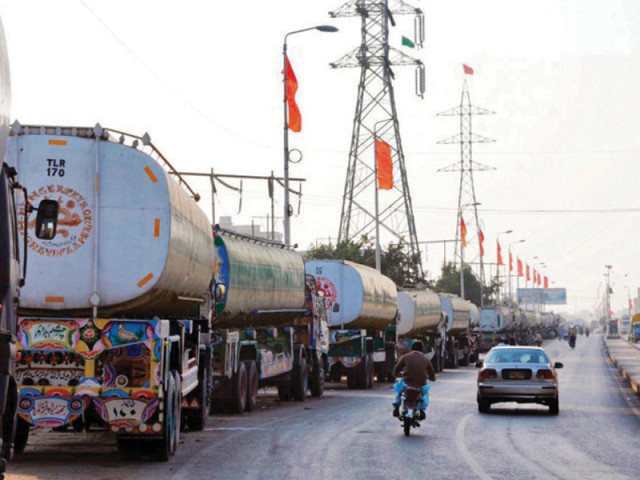Oil transporters continue strike as dialogue fails
Continued suspension is feared to create shortage of petroleum products nationwide

The talks came following protest from transporters against the government’s decision to increase income tax on goods transport vehicles from Rs1 to Rs5 per laden weight and on passenger vehicles from Rs100 to Rs500 per seat. PHOTO: FILE
The transporters have been on a wheel-jam strike since Monday morning in protest against implementation of oil transportation safety regulations introduced by the Oil and Gas Regulatory Authority (Ogra) in 2009.
The continued strike is feared to create shortage of petroleum products at fuel stations nationwide.
The National Highway Authority (NHA) is also among the authorities implementing the regulations as it checks the safety standards in oil tankers transporting flammable commodity from Karachi's ports to the upcountry.
The Ahmedpur Sharqia oil tanker accident that occurred a day before Eid and killed over 200 people in a huge inferno in June 2017 - served as a wake-up call for the authorities that have become strict with the oil transporters.
Fuel shortage feared as tankers stop supply
Oil Tankers Contractors Association President Babar Ismail told The Express Tribune in a telephonic conversation, “we have left the meeting in the middle after Ogra chairperson said they want to talk on the issue with oil marketing companies (like PSO, Shell and Hascol) instead of oil tankers' owners.”
The Ministry of Petroleum and Natural Resources secretary had called all the stakeholders to his office in Islamabad to have dialogue on the issue and convince oil tankers’ owners to call off the strike.
The stakeholders included Ogra, NHA, oil marketing companies and oil tanker owners’ representative bodies.
FY17: With start of new projects, oil production edges up 3%
“The Ogra chairperson was of the view that oil marketing companies were responsible for ensuring implementation of the regulations,” Ismail said.
An official at Ogra said the industry had demanded five years to implement the regulations. However, the regulations remain unimplemented despite the fact that eight years have passed since the regulations were introduced.
The regulations demand that tankers transporting oil should have four axles instead of three, it was learnt.




1733130350-0/Untitled-design-(76)1733130350-0-208x130.webp)













COMMENTS
Comments are moderated and generally will be posted if they are on-topic and not abusive.
For more information, please see our Comments FAQ